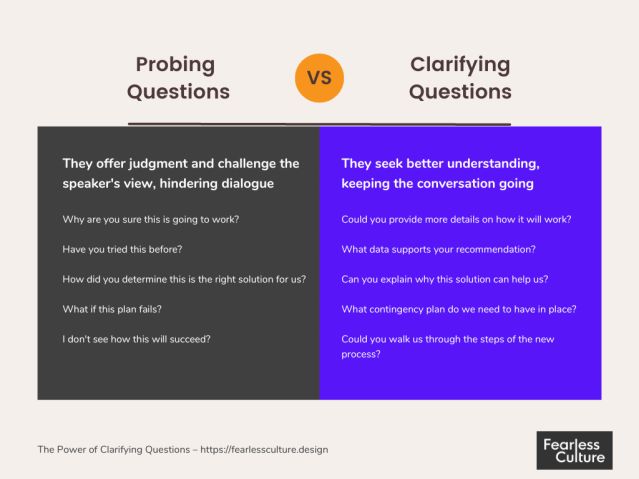Cross-Cultural Psychology
Clarifying Questions Will Help You Be a Better Listener
Being a good listener is not a passive role.
Posted March 17, 2023 Reviewed by Tyler Woods
Key points
- Asking clarifying questions helps us become better listeners.
- Clarifying questions delay the urge to jump to reactions.
- Good listening is not about being a passive observer but engaging in fruitful conversations.
- The quality of conversations is directly correlated to the questions people ask.
The art of proper questioning has become lost in today's world, resulting in poorer decision-making. Great listeners know to avoid making assumptions, instead using powerful questions to understand the facts before passing judgment.
Asking questions means you want to learn. Clarifying questions can help you understand what others are saying, identify new solutions, and evaluate alternatives.
Clarifying Questions Improve Active Listening
Asking clarifying questions is a way to become a better listener, and this is a cooperative conversation. Questions can help refine ideas and opinions and minimize any misunderstanding, confusion, or ambiguity.
Most people think being a good listener comes down to paying attention, not interrupting the speaker, and being able to repeat back what they said. However, we’ve got it all wrong, according to research.
Good listening is not about being a passive observer but engaging in fruitful conversations. Questions turn the “speaker versus hearer” division into a dialogue, making everyone feel heard and thrilled.
Effective team conversations require building off each other’s solutions. This means uncovering the value of an idea before discarding it simply because you didn’t understand or like it at first glance.

We often use probing questions when presented with a new concept or opinion, but this can come across as confrontational or critical, discouraging open dialogue.
Clarifying questions provide a pause, delaying the urge to jump to reactions, while probing questions offer judgment. We want to encourage the former and avoid the latter.
How to Ask (Better) Clarifying Questions
Organizations have realized that leaders who ask good questions are more valuable than those who want to have all the answers. The demand for executives who listen empathetically, welcome input, and rally people around a shared future is increasing.
Unfortunately, most leaders and team members rarely ask others to expand on an opinion or further describe an idea. They usually jump to judgment. Then, when they do ask questions, their intent is not to seek understanding but to express an opinion or judgment.
Asking clarifying questions before assessing an idea or opinion has many benefits:
- They help you clarify instructions from your manager or colleague
- They allow you to fill in the gaps so you can understand the whole picture
- They encourage speakers to be clearer and more specific
- They promote a fluid dialogue between speakers and listeners
- They train you to practice active listening
To improve communication and collaboration within a team, asking better clarifying questions is crucial. The quality of conversations is directly correlated to the questions people ask. Good listening is a choice to go beyond the superficial, engaging in fruitful conversations that amplify, energize, and clarify thinking.
For example, instead of reacting to a team member's idea with, "That's a terrible idea," you could ask, "Can you tell me what inspired you to come up with this idea?” or, “How do you think it will help solve our customers’ problems?”
Clarifying questions also provide feedback to the speaker, indicating which parts of their message were unclear. If you’re confused, asking for more details will provide clues about what’s missing. For example, ask, “Can you explain more about what it would take to implement this new process you just described?”
There are two types of clarifying questions:
Open questions encourage the speaker to expand their thoughts and ideas.
Validation questions invite the speaker to confirm what or whether the listener understood.
Here are some examples of clarifying questions to use as a reference:
- Can you tell me more?”
- What do you mean by ____?
- Can you give me an example?”
- Could you explain _____ in another way?
- What is an example of this concept?
- Why do you think that?
Effective team conversations require building off each other’s solutions, which means uncovering the value of an idea before discarding it simply because you didn’t understand or like it at first glance.
In summary, asking clarifying questions helps us become better listeners, encourages us to seek more information, and creates a culture of understanding. This is vital for effective communication and collaboration within a team and is a valuable leadership skill.




